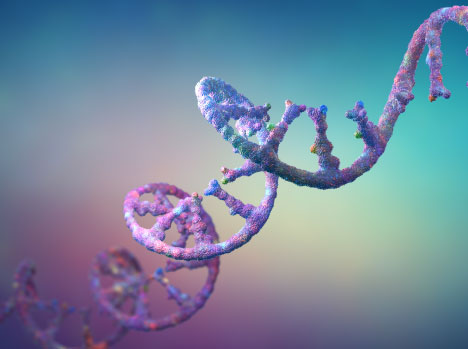
AexeRNA is a tiny startup that largely exists on paper. It has no lab or staff scientists, just a former patent lawyer as its CEO and several scientific co-founders, including mRNA pioneer and recent Nobel Prize laureate Drew Weissman from the University of Pennsylvania, and bioengineer Michael Buschmann of George Mason University.
When asked by Endpoints, neither AexeRNA nor BioNTech would disclose financial terms of the acquisition, which closed earlier this week. But the deal exemplifies the intense interest even established mRNA players have in finding new delivery formulations to tap into the full potential of mRNA therapies and vaccines.
In an interview with Endpoints, AexeRNA CEO and co-founder Thomas Haag said the startup had raised a small seed funding in the “low single-digit millions” before being “inundated” with suitors.
“Everybody needs a delivery system, and there’s just not a lot of options,” Haag said.
New technology, new targets
Lipid nanoparticles, or LNPs, are tiny balls of synthetic fat molecules that protect mRNA and shuttle it into cells. Existing LNPs are good at spurring immune responses when injected into the arm, or ferrying medicines to the liver when infused in the bloodstream. But some scientists think there’s room for improvement, and many believe new nanoparticles are needed to get medicines to other parts of the body.

“There’s a big appetite out there for alternatives,” Haag said.
BioNTech is developing several mRNA therapies and an individualized mRNA vaccine for cancer. The company said in an email that the “acquisition is consistent with BioNTech’s continued investment in and evaluation of novel mRNA delivery technologies.”
A key ingredient in LNPs is the ionizable lipid. Positively charged fat molecules clump to the negatively charged mRNA molecule, forming the particles and holding them together.
The most widely used ionizable lipids were largely the product of “poking around in the dark,” Haag said. Buschmann, AexeRNA’s central co-founder and former chief scientific officer, died in 2022. But his work unraveled how changes to the lipid’s charge at different acidities would affect its potency and ability to gravitate toward different cells.
The company has synthesized more than 130 ionizable lipids, and found that one of them is roughly four to 10 times more potent than a benchmark lipid, suggesting it could lead to more effective medicines, lower doses, or both, Haag said. Some of AexeRNA’s lipids may enhance immune reactions in vaccines, while others could help minimize unwanted reactions in chronic therapies, he added.
Haag initially worried that AexeRNA would be stepping into a patent minefield. LNP intellectual property is a notoriously messy space, and BioNTech, Moderna, Pfizer, and numerous smaller companies have become entangled in LNP patent infringement lawsuits filed in the wake of the pandemic.
But he became convinced that Buschmann’s lipids “circumvented” many existing patents, so he helped license the inventions from George Mason and UPenn, which got undisclosed equity in the startup. Haag said the company was primarily backed by “high net-worth individuals” and his investment firm, Linden Lake Venture Capital.
Early interest, then a tragedy
In late 2021, AexeRNA had recently been accepted into Johnson & Johnson’s biotech incubator in Washington, DC. But a flurry of outreach from biotech and pharma companies wanting to license the startup’s nanoparticles led AexeRNA to forego the lab bench and plans to raise additional venture capital funding.
“We quickly became inundated with interest,” Haag said. “Through that process, it became clear that we would be acquired in short order.”
But as AexeRNA was negotiating a deal with an undisclosed pharma company, tragedy struck. In early March 2022, Buschmann was killed in his home, allegedly by his son, according to numerous news reports.
Without his leadership, the startup’s future was murky. But he had outlined “meticulous plans” for making and testing new lipids, Haag said.
As the negotiations with that original pharma partner began to fall through, AexeRNA returned to its other suitors. The term sheets piled up quickly, Haag said, and after striking a brief collaboration with BioNTech to test-drive AexeRNA’s nanoparticles, the two companies closed and signed the acquisition earlier this week.

Check out our mRNA service to expedite your vaccine research
PackGene Biotech is a world-leading CRO and CDMO, excelling in AAV vectors, mRNA, plasmid DNA, and lentiviral vector solutions. Our comprehensive offerings span from vector design and construction to AAV, lentivirus, and mRNA services. With a sharp focus on early-stage drug discovery, preclinical development, and cell and gene therapy trials, we deliver cost-effective, dependable, and scalable production solutions. Leveraging our groundbreaking π-alpha 293 AAV high-yield platform, we amplify AAV production by up to 10-fold, yielding up to 1e+17vg per batch to meet diverse commercial and clinical project needs. Moreover, our tailored mRNA and LNP products and services cater to every stage of drug and vaccine development, from research to GMP production, providing a seamless, end-to-end solution.
Related News
Exploring Tau Protein’s Role in Glaucoma: New Insights and Therapeutic Potential
Glaucoma, a chronic neurodegenerative disorder, leads to irreversible vision loss by damaging retinal ganglion cells (RGCs) and the optic nerve, often associated with increased intraocular pressure (IOP). Despite the benefits of IOP-lowering treatments, the underlying...
FDA-mandated CAR-T monitoring period could be halved, say researchers
In patients with diffuse large B-cell non-Hodgkin lymphoma (DLBCL), the two hallmark post-chimeric antigen receptor (CAR)-T therapy toxicities are extremely rare after two weeks, supporting a shorter, more flexible toxicity monitoring period, according to a study...
Ancestral CRISPR-Cas13 Ribonucleases Discovered: Implications for Genome Editing
In a pioneering study published in *Science*, a team of researchers led by Peter H. Yoon and Jennifer A. Doudna from the University of California, Berkeley, has made a remarkable discovery in the realm of CRISPR technology. The team has identified an ancestral clade...
KBI Biopharma Expands Manufacturing Contract with Global Pharmaceutical Company
KBI Biopharma Inc., a JSR Life Sciences company and global cGMP contract development and manufacturing organization (CDMO), has extended and expanded its manufacturing contract with a leading global pharmaceutical company. Originally initiated in 2020, the renewed...
Related Services

